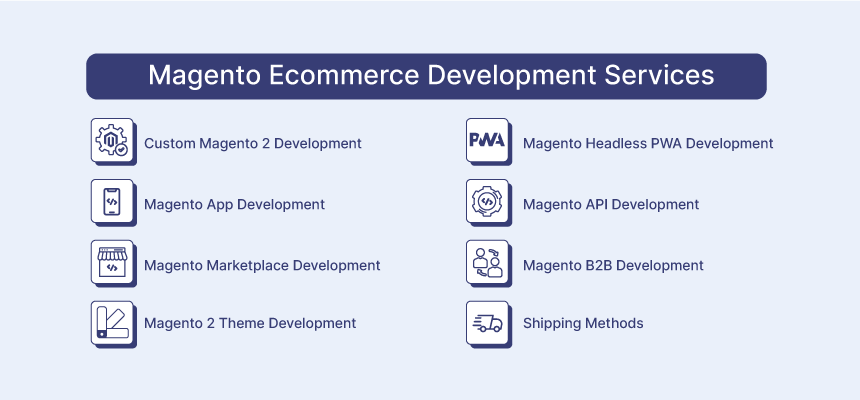
Ecommerce Magento Development: Expert Tips and Services
Ecommerce Magento development enables businesses to create scalable and customizable online stores. It provides flexible product management, multi-store capabilities, mobile-friendly design, SEO optimization, secure payment integration, robust analytics, etc. This article will explore the 11 expert tips for successful Ecommerce Magento development.
Key Takeaways
-
Use Magento's flexibility and SEO optimization features to create a responsive, high-ranking ecommerce store.
-
Prioritize a user-friendly design and mobile optimization to cater to the growing number of mobile shoppers.
-
Stay updated with Magento versions, implement strong security measures, and use high-quality images to enhance the user experience.
-
Implement analytics and develop engaging content to drive traffic and improve customer engagement.
-
Consider Magento's scalability for high traffic resilience and its community and expert support for ongoing development and troubleshooting needs.
Reasons to Choose Ecommerce Magento Development
1. Flexibility and Scalability
Magento offers a flexible platform to meet the ever-changing needs of businesses. It allows for easy customization and integration with third-party extensions, making it suitable for various industries.
2. Multi-Store Capabilities
With Magento, businesses can manage multiple online stores from a single dashboard. This saves time and resources while providing a centralized location for managing product inventory, customer data, and orders.
3. Mobile-Friendly Design
Magento offers built-in mobile-friendly design features, ensuring your store looks great on any device. It optimizes your site for mobile SEO.
4. SEO Optimization
Magento has in-built SEO options that help improve search engine rankings and drive more organic traffic to your online store. It also allows for easy customization of title tags, meta descriptions, URLs, and more.
5. Secure Payment Integration
Magento offers secure integration with popular payment gateways like PayPal, Stripe, and Authorize. net. This provides customers with a seamless checkout experience and ensures the security of their sensitive information.
6. Robust Analytics
With Magento, businesses can track and analyze their online store's performance through built-in reporting and analytics tools. This data helps make informed decisions to improve the overall success of the Ecommerce platform.
7. Community Support
Magento has a large community of developers, experts, and users who constantly share knowledge, tips, and solutions for common issues. This provides a valuable support system for businesses using the platform.
8. Scalability and Flexibility
Magento is built to handle large amounts of products, orders, and website traffic. This makes it a suitable choice for growing businesses needing an Ecommerce platform to scale with their growth.
9. Customization Options
Magento offers various customization options, from design templates to extensions and plugins. This allows businesses to create a unique and personalized online store catering to their needs.
10. Multi-language and Currency Support
For businesses operating in multiple countries, Magento offers multilingual and multi-currency support. This makes reaching a global audience easier and provides a seamless shopping experience for customers from different regions.
11. Third-Party Integrations
Magento can integrate with various third-party tools and services, allowing businesses to streamline processes and improve efficiency. This includes integrations with marketing automation, inventory management, and shipping software.
Tips for Successful Magento Ecommerce Development
1. Prioritize User-Friendly Design

Ensure your Magento store is easy to navigate by keeping a clean, intuitive design. This enhances user experience and can lead to increased sales. A user-friendly design includes mobile responsiveness, as many shoppers use mobile devices. Ensure your website works smoothly on all platforms to capture this growing market.
2. Optimize for Mobile Devices

With mobile commerce on the rise, optimize your store for mobile users. Responsive design is crucial for reaching a wider audience. A mobile-first approach ensures accessibility on smaller screens and swift page loading, reducing bounce rates and potentially increasing conversion. Facilitating an omnichannel presence is crucial, enabling seamless user switching between devices and platforms.
3. Keep Your Magento Platform Updated

Stay current with Magento updates for security and performance improvements. This also enables you to utilize the latest features. Regularly updating Magento ensures protection against security threats. It's essential for maintaining a safe shopping experience for your customers.
4. Simplify the Checkout Process

Reduce cart abandonment by streamlining the checkout process. Fewer steps and clear instructions can enhance the customer experience. Consider guest checkout options to facilitate faster purchases. Transparent shipping costs and return policies also add to consumer trust.
5. Regularly Test Your Website

Run periodic tests to ensure all website functions perform correctly. This includes checking loading speeds, payment gateways, and user navigation.
Monitor user feedback for insights on website usability and functionality. Address issues promptly to maintain customer satisfaction. Stay vigilant with uptime monitoring to prevent unexpected website downtimes.
6. Implement Robust Security Measures

Protect customer data with strong security protocols such as SSL certificates and regular security audits to build trust. Use two-factor authentication for enhanced security measures. Regularly update privacy policies to comply with the latest regulations.
7. Use Data Analytics to Drive Decisions

Leverage analytics to understand customer behavior and market trends. This can inform adjustments for better performance. Data-driven insights can optimize your marketing strategies and website design. Adjust to customer needs by analyzing metrics like bounce rates and conversion paths.
8. Increase Website Speed

Optimize your website's loading times to enhance user experience and improve SEO rankings. You can significantly decrease page load times by compressing images, utilizing caching, and minimizing code. This helps keep visitors engaged and reduces bounce rates. Faster loading times are essential for user retention. Speed optimization can greatly impact customer satisfaction and overall site performance.
Magento Ecommerce Development Services

1. Custom Magento 2 Development
Custom Magento 2 Development tailors an ecommerce platform to your specific business needs. It provides bespoke solutions, enhancing your online store's functionality and user experience. Enhance your ecommerce presence with custom themes, modules, and integrations developed by experts.
2. Magento App Development
Magento App Development extends your online store's capabilities for mobile devices. It delivers a seamless shopping experience on smartphones and tablets. Increase your reach and improve sales with native apps that reflect your brand's identity and values.
3. Magento Marketplace Development
Magento Marketplace Development allows for creating a multi-vendor ecosystem within your ecommerce platform. Empower multiple sellers to list their products while you control the administrative functions. This opens up new revenue channels and diversifies your product offerings.
4. Magento 2 Theme Development
Magento 2 Theme Development is about crafting a visual identity that resonates with your target audience. A custom theme not only looks attractive but also improves navigation and usability. Stand out in the digital marketplace with a unique design that captivates customers.
5. Magento Headless PWA Development
Magento Headless PWA Development separates the front and back end, providing flexibility to use modern front-end technologies. This approach delivers lightning-fast, app-like experiences on the web. Engage users with an intuitive interface and offline capabilities.
6. Magento API Development
Magento API Development facilitates integration with external systems and applications. Seamlessly sync your ecommerce store with Magento CRMs, ERPs, or other third-party services. APIs ensure that your store can grow and adapt to changing business landscapes.
7. Magento B2B Development
Magento B2B Development focuses on the needs of wholesale buyers and large-scale business transactions. It streamlines ordering, billing, and inventory management for B2B clients. Provide a personalized and efficient shopping experience to your business customers.
8. Shipping Methods
Developing customized shipping methods within Magento can optimize the fulfillment process. Integrate with carriers, offer flexible shipping options, and automate calculations. A tailored shipping approach can reduce costs and enhance customer satisfaction.
How to Choose an Ecommerce Magento Development Service
-
Experience and expertise in Magento: Look for a service provider with experience and expertise in developing on the Magento platform. They should have a strong portfolio of successful projects and know the latest updates and features.
-
Choose Managed Magento Hosting: Managed Magento Hosting provides support, maintenance, and updates for your website. This can save time and resources, allowing you to focus on other aspects of your business.
-
Integration capabilities: When choosing a Magento development service, consider their capabilities. They should be able to seamlessly integrate with other systems and applications to enhance the functionality of your ecommerce store.
-
Customization options: Your ecommerce store should stand out from the competition. Look for a development service that offers customization options, allowing you to create a unique and personalized shopping experience for your customers.
-
Support and maintenance: A reliable Magento development service should provide ongoing support and maintenance to ensure your website runs smoothly and efficiently. Look for a service provider with excellent customer support and quick response times.
FAQs
1. What are the benefits of using a gateway for payment methods in Magento ecommerce?
Adobe provides a secure and efficient gateway for payment methods, ensuring customers can make transactions safely. This technology enhances user experience (UX) and trust, which is crucial for ecommerce platforms. A good gateway also simplifies the checkout process, reducing cart abandonment rates.
2. Can a Magento developer help customize my catalog for a project?
Yes, a skilled Magento developer can tailor your catalog to match the specific size and requirements of your ecommerce project. They can guide you through customization options, leveraging Magento's technology to create a solution that aligns with your company's goals.
3. How does Magento support SEO to drive traffic to my ecommerce site?
Magento offers robust search engine optimization (SEO) capabilities, including SEO-friendly URLs, meta-data, and more. Magento can be integrated with SEO modules for further enhancement, and a partner developer can implement advanced strategies to optimize your site's pages.
4. What is the cost of integrating third-party services like FedEx into my ecommerce site?
The cost of integrating services like FedEx can vary greatly depending on your ecommerce requirements and architecture complexity. Consultation with your development service provider can determine the price, which often results in better shipping options and can improve overall customer service.
5. Does Magento support B2C and B2B ecommerce solutions, and how can it cater to both?
Magento is a versatile open-source ecommerce platform that can power B2C and B2B solutions. Its flexible architecture allows various configurations and caters to business models, from detailed customer service portals to efficient order processing systems.
6. Can Magento handle high traffic volumes during peak times for large enterprises?
Magento is built to scale, and with the right hosting and developer support, it can easily manage thousands of transactions and high traffic. This platform offers enterprises the robustness required for peak performance, even during periods of heavy load.
7. How can a team ensure that merchants and brands connect effectively with people in e-commerce?
A dedicated team is essential for bridging the gap between merchants, brands, and consumers in an e-commerce setting. They orchestrate strategies that personalize the shopping experience, use data to predict shopping trends, and engage customers through targeted marketing, ultimately establishing a strong connection with the people who drive online commerce.
Summary
Choosing ecommerce Magento development provides scalable performance, customization options, and access to a thriving developer community. Magento's support for B2C and B2B solutions makes it a popular choice for businesses of all sizes. Opt for Managed Magento hosting for optimized performance, security, and expert support to keep your ecommerce platform running smoothly.



